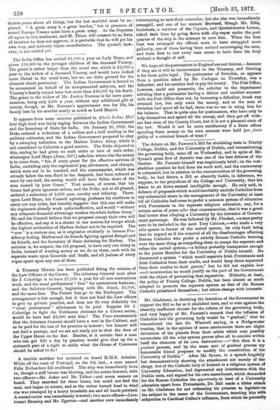It appears from some minutes published in Allen's Indian Mail
that high feud was lately raging between the Indian Government and the Secretary of State for India. On January 26, 1869, the Duke ordered a reduction of a million and a half sterling in the military estimates, and the Indian Government prepared to obey by a sweeping reduction in the Madras Native Army, which is not considered in Calcutta a good reserve. The Duke objected to this, saying he had given no such order or hint of such order, whereupon Lord Mayo (June, 1871) asks him where else the money is to come from, "for, if every grant for the effective services of India, excluding only the regimental pay, allowances, and charges, which were not to be touched, and the commissariat, which was already below the sum fixed in the despatch, had been reduced at once by one-half, the saving would still have fallen short of the sum named by your Grace." That means, of course, that his Grace had given ignorant orders, and the Duke, not at all pleased, ordered a reduction of 9,000 men, cavalry and infantry. There- upon Lord Mayo, his Council agreeing, professes his readiness to carry out any order, but humbly suggests that this one will make the regiments already weak quite ineffective, and would "without any adequate financial advantage weaken the whole Indian Army." He and his Council believe that no proposal except their own will be effective, and say it is a shame to tax natives for troops which the highest authorities of Madras declare not to be required. The "row" is a curious one, as it originates evidently in intense Pre- sidency feeling, Madras and its friends fighting against Bengal and its friends, and the Secretary of State declaring for Madras. The solution is, we suspect, the old proposal, to have only one Army in India, instead of wasting money as we do on three, each with its separate waste upon Generals and Staffs, and all jealous of every rupee spent upon any one of them.


































 Previous page
Previous page